Bridging Gaps through Participatory Community Development
According to Eurostat, in 2017 Romania was one of the countries with the lowest Gross Domestic Product (GDP) in the EU, with groups such as ethnic Roma largely living in disproportionate poverty and facing various forms of discrimination. Ensuring that their basic needs and rights are fulfilled requires long-term commitment. It is especially important to focus on bridging gaps in education and employment. The Romanian Red Cross is one of few non-governmental actors implementing measures to achieve these goals.
A collaboration between the Romanian Red Cross and the Swedish Red Cross, the Participatory Community Development (PCD) Programme ran from 2016 through to 2018. Its aim was to help vulnerable and marginalised communities in Romania.
Many within the group receiving support were ethnic Roma, as they face a long history of discrimination and inequality, coupled with a lack of tools and avenues to address them. However, Roma were by no means the only people who participated in the project. Another key objective of the programme was cross-community work involving people from different backgrounds and groups collectively identifying needs and collaborating in tackling them. The project also served to raise awareness of the issues these minority groups face, as well as to inform local authorities and the public about the positive effect that helping the most vulnerable has on the community.
Activities were selected based on the needs expressed by the Roma community and aimed to deal with the problems faced in everyday life. Homes and public spaces were renovated and prepared for the winter, as many were in need of repair, or lacked insulation or heating. People also received basic healthcare and hygiene services.

Other micro-projects helped Roma children by creating a club for group activities. Others put culture at the forefront, showcasing traditional art, music, and dance at dedicated events. In one of the participating communities, a cultural Christmas gala was held, where people could share their music, talent, and handicrafts, while also promoting associated income-generating opportunities.
When working with children and young people from these communities, priority was placed on providing safe and friendly spaces where they could spend their time. Many of them were predominantly unaccompanied, with their parents often abroad seeking better economic opportunities. In Babadag (Tulcea County), local high school students actively volunteered as mentors and leaders in the activities dedicated to children. The main purpose was to provide a secure space where they could go for educational and recreational purposes – to learn life skills and receive help with schoolwork, or just be kids. A major focus was put on preparing children to enter school for the first time, which according to all reports has succeeded beyond expectations. The local community participated by donating books and recreational items for the kids in accordance with their needs.
In each community, the Romanian Red Cross also assisted in advocating local authorities around the needs and challenges, as well as the importance and value of providing support to the most vulnerable groups in society.
Establishing the direction of the project relied almost entirely on the community it aimed to support, as Roma people contributed to all aspects. They identified their most important needs, considering the specific requirements and situations of all groups. On its part, the Romanian Red Cross provided the necessary materials, infrastructure, and technical support.
Open dialogue throughout the implementation gave the community members a forum for discussion and a chance to openly present any difficulties or proposed changes, which the Red Cross strove to address. Making a difference in community work takes time and requires a shift in attitude.
Basic information
Activity name
Participatory Community Development Programme
Country
Romania
Duration
2016 - 2018
Partners
Swedish Red Cross, Romanian Red Cross

